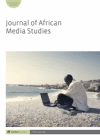
Full text loading...

In addition to the devastating loss of lives, the harm caused by the COVID-19 pandemic to individuals and communities around the world has caused seismic disruptions in economic, social and interpersonal relationships. The pandemic has affected international diplomatic relations as well by amplifying existing geopolitical tensions. By situating discourses of Africa and Africans within global ferments of pandemic politics, this study interrogates how Africa and its peoples were invoked in global media. Drawing from postcolonial theory and conceptual propositions of Afrophobia, the study uses multimodal discourse analysis to critically examine news stories that engaged with two phenomena: controversies regarding the African director-general of the World Health Organization (WHO) and xenophobic treatment of Africans in China. Findings indicate elements of Afrophobia were evident in the Trump Administration’s and US conservative media outlets’ engagement with WHO. Additionally, the study showed the mainstreaming of non-western Afrophobia through the example of the xenophobic treatment of Africans in China. It concludes by proposing a contextual, intersectional and critical geopolitical analytical optics for a more robust understanding of the global Black experience.

Article metrics loading...

Full text loading...
References


Data & Media loading...

Publication Date:
https://doi.org/10.1386/jams_00071_1 Published content will be available immediately after check-out or when it is released in case of a pre-order. Please make sure to be logged in to see all available purchase options.